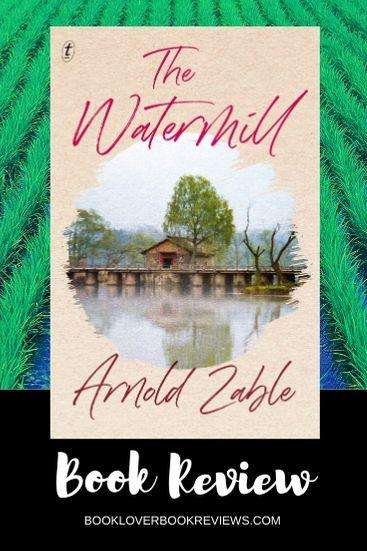The Watermill by Arnold Zable, Review: Moving stories of resilience
Arnold Zable’s The Watermill is a thought-provoking essay collection highlighting both the brutality and strength of human nature. Read on for our full review.
The Watermill Book Synopsis
 Ranging from remote provinces in China and Cambodia to pre- and post-war Yiddish Poland, Kurdish Iraq and Iran, and Indigenous and present-day Melbourne, Arnold Zable’s quartet of stories depicts the ebbs and flows of trauma and healing, memory and forgetting, the ancient and the contemporary. And ever-recurring journeys in search of belonging.
Ranging from remote provinces in China and Cambodia to pre- and post-war Yiddish Poland, Kurdish Iraq and Iran, and Indigenous and present-day Melbourne, Arnold Zable’s quartet of stories depicts the ebbs and flows of trauma and healing, memory and forgetting, the ancient and the contemporary. And ever-recurring journeys in search of belonging.
(Text Publishing, March 2020)
Disclosure: If you click a link in this post we may earn a small commission to help offset our running costs.
BOOK REVIEW
To say the subject matter within Arnold Zable’s collection of essays, The Watermill is not uplifting would be somewhat of an understatement. The wrongs perpetrated are incalculable and, quite frankly, incomprehensible to those of us that have lived lives with minimal hardship and our liberty uncurbed. However, the resilience of the people that is their focus is inspiring.
This being my first experience of Arnold Zable’s writing, I was immediately struck by the confluence of a talented observer’s objectivity and well-spring of empathy for people far and wide. His respect for lived experience, for the elderly. His appreciation of, and the value he ascribes to, the smallest moments, from a hand gesture that is a tell for a Holocaust survivor’s coping mechanism (Republic of the Stateless), to the perilous nature of the individual against the immensity of both nature and political/societal forces.
The bus laboured on the heights past farmers climbing the steep slopes between the terraced paddies. The passengers were lulled into slumber by the drone of the engine and the faint sound of an infant singing. The reverie was jolted by a baby screaming, as if she had suddenly woken and sensed the immensity of the world about her: precipices at the edge of the earth plummeting into a frightening infinity. Even those who had lived here their entire lives now seemed in awe of the scale of the landscape. (The Watermill)
Powerful stories
Zable acknowledges the great responsibility that comes with the role of storyteller; to listen, document and raise awareness of historical trauma and brutality. And, by employing his enviable command of language to do this, he certainly has the capacity to influence hearts and minds.
Each of us has a role: teller, interpreter and listener. Story is the currency that unites us, conferring on us a detached intimacy. The milling crowds appear like a supporting cast in a pantomime. (The Ballad of Keo Narom)
But what I admired most is the unerring dignity and respect for people that shines from Zable’s narratives. Of the many quotable examples, this in Where We Meet of a photo of a Wurundjeri clan leader, William Barak:
His dignity cut through, and his presence drew people to him. His being transcended his enclosure, and undermined the prejudices of those who saw him as a curiosity.
That, and the honesty and authenticity of his narrative voice, including the telling of his own parent’s story, and their enduring scars, also in Where We Meet:
Mother tells stories through song. It is too painful to tell them in prose.
Arnold Zable’s The Watermill is a potent and moving reminder that people can survive the unfathomable, but that in doing so they will be changed forever.
BOOK RATING: The Story 4 / 5 ; The Writing 4.5 / 5 — Overall 4.25
Get your copy of The Watermill from:
Booktopia (AU) Book Depository Kobo Amazon
Genre: Memoir, Non-Fiction, Short Stories & Essays
If you like the sound of The Watermill, you may also appreciate:
Riding the Trains in Japan by Patrick Holland / Little Princes by Conor Grennan / Jane Doe January: My Twenty-Year Search for Truth and Justice by Emily Winslow / Mr Snack & The Ladywater: Travel Tales From My Lost Years by Brendan Shanahan / Skin In The Game: The pleasure and pain of telling true stories by Sonya Voumard
This review counts toward my participation in the Aussie Author Challenge 2020 and the 2020 NonFiction Reader Challenge.
About the Author, Arnold Zable
Arnold Zable is a highly acclaimed novelist, storyteller and human rights advocate. His works include Cafe Scheherazade, Scraps of Heaven, Violin Lessons and The Fighter, which was shortlisted for a Victorian Premier’s Literary Award and a New South Wales Premier’s Literary Award. Zable lives in Melbourne.
* My receiving a copy from the publisher for review purposes did not impact the expression of my honest opinions.

